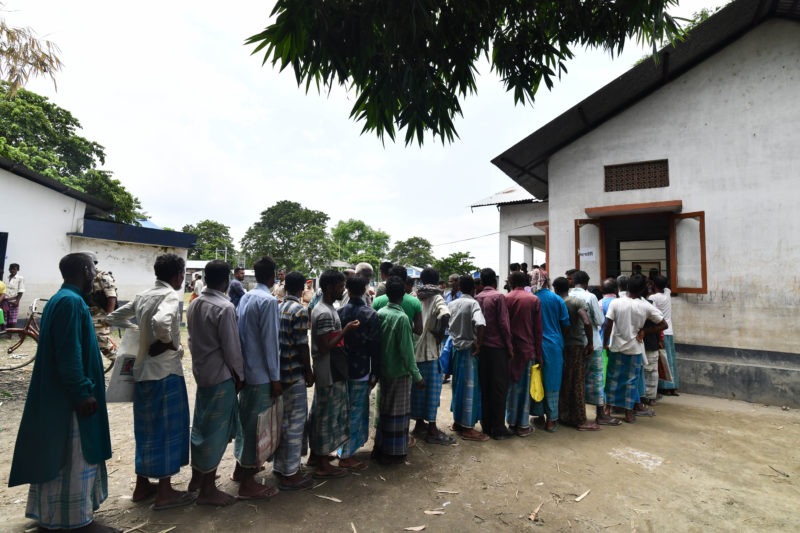India’s National Register of Citizens Unsettles Assam – A Citizen Update Operation Turns Absurd
Gokul Chandra Saha is among nearly two million people in Assam facing statelessness. (AFP photo)
A much desired initiative to protect the culture, rights and identity of Assam, in line with the 1985 Assam peace accord, by weeding out illegal immigrants from Bangladesh, has only turned out to be a cause of universal dismay, panic and controversy, raising credibility concerns, writes Priyanka Bhardwaj.
The ruling Bharatiya Janata Party (BJP) that enthusiastically embarked upon this most extensive citizen engaging exercise, the National Register of Citizens (NRC) in the state are on the same page with the Assam Public Works that is the principal petitioner in this demand for NRC operation, the All Assam Students’ Union and the opposition Congress, and BJP’s strongman, Himanta Biswa Sarma has called for a substantial review of the process, admitting to occurrence of several anomalies, even though an earlier appeal for a recount was rejected by the Supreme Court.
To begin with the errors, the results of the final NRC List have thrown up a figure of 1,906,645 as illegals (roughly six per cent of the total population of Assam) and mostly Hindu Bengalis, as against the popular right wing perception that 2.1 million illegals along with their descendants have created demographic shift in the state.
Hindu groups, especially the BJP and Akhil Bharatiya Vidyarthi Parishad, of the Sangh Parivar, are incensed that more Bengali Hindus, who form the voter base of the BJP, have been netted in the dragnet of NRC.
Though no official data has been released by NRC there are local reports that in three Muslim-dominated border districts, Dhubri, South Salmara and Karimganj, only around 7 per cent were designated non-citizens, while 12.91 per cent have been declared non-citizens in Hindu-dominated border district Cachar.
Moreover Bengali Hindus unlike Bengali Muslims are not mere economic migrants.

It is a well-established fact that Hindus residing in Islamic countries on either side of India’s borders have been victims of massive religious persecution and genocide since 1947 and has only India to turn to save their lives and New Delhi cannot afford to turn a blind eye to this humanitarian crisis.
Further there have been unexplained omissions of specific members of a family from the list, absence of army soldiers, Bhumiputras (sons and daughters of the soil), indigenous tribal population in Tinsukhia, Dibrugarh and Sivsagar districts in Upper Assam, who did not bother to apply for the NRC, and ethnic Assamese Muslims whose pressure groups have alleged “intentional exclusion” and have thus filed a case against NRC coordinator, Prateek Hajela.
As the cut-off date for inclusion in the list is March 24, 1971 there are also issues of inadequate or lack of proper documents, reliance on tattered, undecipherable old documentation riddled with misspellings, and sheer inability of poor illiterate citizens to fill out the complicated form or make the required number of visits to the centers of application.
As per the next stage of NRC, there is a time frame of 120 days set aside for appeals and grievances to be addressed by Foreigners’ Tribunals to be set up in each block and manned by six qualified members.
However, it is yet not clear from whence this qualified man power would be roped in and if at all there is a guarantee that no bonafide citizen would be left out of the list.
Already countless people have been detained in jails and Rs.12billion expended in the process and the government has not arrived at any plan on where and how to house the illegals once the register is sealed.
With no pact with neighboring Bangladesh on repatriation of illegal Bangladeshis in India, especially those who have now settled in Assam for generations the imminence of statelessness looms large on their fates and probably also weighs on New Delhi’s international stand on human rights.
A country whose population figures are expected to overtake those of China, courts of law are flooded with close to 32 million pending cases, and an administration already overburdened, the rights, lives, dignity and security of innocents become an easy barter for rounding up of proverbial culprits, reflective of the infamous insouciant Indian attitude.
It is therefore the duty of the Government to ensure efficiency, accuracy and compassion in plans for rehabilitation of illegals as would emerge in the final tally before it sets out to pass the Citizenship Amendment Bill.

